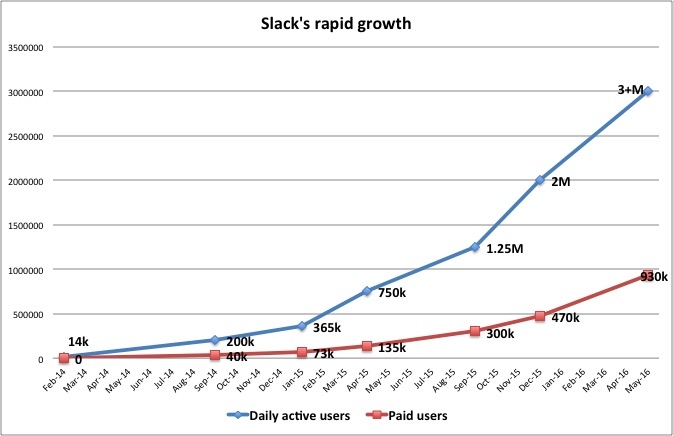Slack announced its investment in 11 robotics companies. What's the big idea behind this?

We can say that it is not difficult for Slack to cash out. In the past few years, Slack has raised a total of 540 million U.S. dollars. In April of this year, when it raised 200 million U.S. dollars, it had a valuation of 3.8 billion U.S. dollars. So what happens when a startup that is in a rapid development stage has more operating funds than it needs? There may be a redistribution of some of the funds, such as setting up a fund to promote and support the impassioned developer community - that's what Slack did. Last year, the company announced the establishment of a $80 million developer fund. Today, Slack disclosed 11 companies in its new portfolio.
This is the details of the company’s first public Slack fund investment company. From its published list, we seem to see a highly intelligent corporate collaboration scenario. Because the companies in the company's Slack portfolio are all related to robots.
Create intelligent enterprise collaboration and create value for users to prove their high valuationThe latest data shows that Slack’s $3.8 billion valuation is based on a rapidly growing user base, which includes paying users and free users.

We can simply do a calculation. If Slack's $3.8 billion valuation is evenly distributed to each daily active user, that's about $1,250 per person. If it were distributed to each paying user, it would be about $4,085. Visible, this is an expensive chat application. Slack needs to narrow the gap between paying users and free users to prove its high valuations, and the services that Slack funds hope to provide are obviously aimed at this as well.
Slack’s loyal users may be defending Slack. The app offers services that go far beyond just the chat of work scenarios. More than 600 applications in the Slack third-party app store App Dictionary can provide evidence for this claim - they have achieved approximately 400% growth since their release in July. From this point of view, Slack sounds more and more like an "operating system" that it promises to collaborate with enterprises, rather than just simply sharing pictures with funny pictures. Because we can see that Slack's investment is related to robots.
New ways of portfolio investment: Slack's latest investment companies are "very robotic"This kind of chatbot that over-reacts to Silicon Valley's echo effect is a bit overdone, isn't it? After all, so many robots that have been introduced to the market, but especially those applications that send messages to consumers, are really a bit of...

But the functional description of the Slack Fund-funded company sounds more promising than the WeatherBug story of the weather-speaking function that was previously discussed—like robots that can perform repetitive tasks on their own to help humans increase their productivity.
Taker.ai, for example, is a robot that promises to cleverly help you find all company files hidden in various drives. Birdly and Sudo can fundamentally reduce the user's need to log on to the platform.
The Slack Fund aims to help companies solve professional problems by using the Slack platform. It does not specifically set the target number of investments, but only makes steady capital injections to those teams that develop applications for Slack. This concept is not new for software companies with a large number of users. Yammer and Jive had done so at the beginning of this decade ten years ago, but they did not succeed. Salesforce's current practice is also a reason, the company now has a huge venture capital and corporate mergers and acquisitions team. Box and Domo are currently only a small range of attempts. Most notably, Slack’s direct competitor, Atlassian, opened a market and received huge cash back from its investment developer team.
If one analyzes Slack's investment with a cynical analyst role, it can be said that Slack looks like he will get the maximum amount of value, and at the same time the portfolio companies' upside is probably just like Slack's. However, newly established startups will see very different results. Butter.ai CEO Jack Hirsch said: "We think it's not that Slack will get all the benefits. Imagine if Apple is providing assistance to the best application developers, giving them exclusive support and involvement in their teams. Funding arrangements...the situation is different. Slack will go beyond this ecosystem and our team is not afraid of working with them."
The following is a list of published portfolios:Butter.ai is a robot that can help users easily access all the company's resources. It is still in beta.
Growbot allows various channels or groups to instantly share the team's "honor" or "support" to improve the team's sense of honor and recognition. Growbot has more than 2,000 team customers.
Abacus is an intelligent expense reporting platform that uses data and behavior analysis to automate the generation and approval of administrative expenses.
Automat is a platform that connects human knowledge technology and artificial intelligence. Through this platform, anyone can easily create a dialogue robot. It is currently being tested.
Birdly is a robot that connects the developer team with Slack and Salesforce. It helps the team track the latest sales metrics, creating a transparent corporate culture environment so that anyone can access Salesforce's information.
Candor can help users improve the interpersonal relationship at work and promote the humanistic care among colleagues. Currently Candor is also in the closed beta phase.
Konsus can provide on-demand services and can help users find suitable freelancers through Slack in a 7/24 mode, which is equivalent to a shared economic platform.
Lattice is an employee performance management system that can be used for employee goal setting, OKRs organizational assessment, weekly check-in or continuity feedback.
Myra Labs specializes in application data programming interfaces (APIs) that simplify the creation and use of scalable, scalable, customizable, and ever-improving machine learning patterns. It is also in the closed beta phase.
Sudo is a robot program that provides a natural language interface on top of the company's CRM (Customer Relationship Management) system. Sales representatives can send Slack messages, phone calls, texts, or emails to Sudo after the meeting ends, and Sudo will be responsible for data entry.
Wade and Wendy are two smart assistants that are designed to make the hiring process human. One of them is for job seekers and the other is for recruiters. Wade is a trusted career planning instructor for job seekers who can recommend personalized opportunities for job seekers based on their understanding of their interests and experiences. Wendy can be seen as a recruitment assistant for companies to help companies screen suitable candidates to complete this repetitive, time-consuming task.